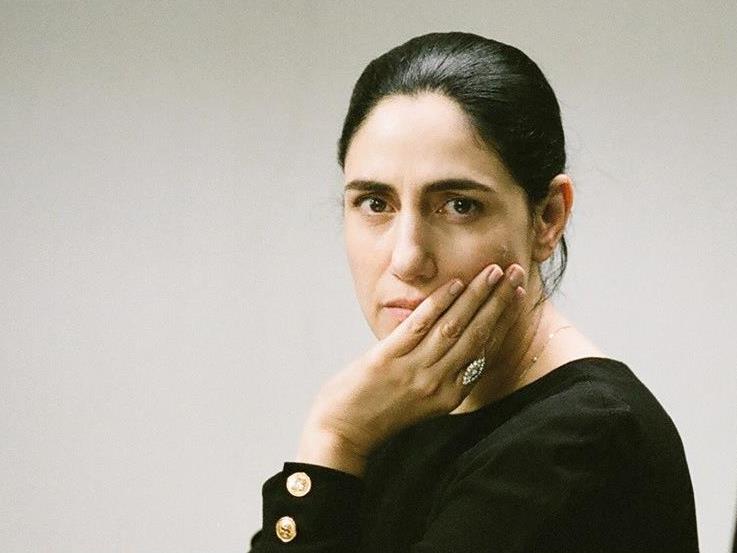When the legal proceedings that give Gett: The Trial of Viviane Amsalem its name commence, in tandem with the film itself, the titular character (Ronit Elkabetz, co-writer and director with her brother Shlomi) has been living away from her husband, Elisha (Simon Abkarian, The Cut), for three years. That’s only the beginning of her punishing plight to secure a divorce, known as gett for Jewish Israelis, in a rabbinical court. The movie’s running time spans 115 argument-filled minutes; its narrative charts the stretching of her quest across the passing of five more annual calendars.
Both are spent confined in the small room that holds Viviane’s fate, only occasionally venturing to the adjacent waiting area outside. At irregular intervals determined by the three judges overseeing the case, the film presents its feuding couple fighting for their respective sides, as represented by her lawyer (Menashe Noy, Big Bad Wolves) and his brother (Sasson Gabai, Hunting Elephants). Days, weeks, months and more passes by, a wealth of emotions flying around the court with them. Of course, what lingers is the ridiculousness of the prolonged predicament, drawn out due to Elisha’s unwillingness to acquiesce to Viviane’s bid for freedom, as well as the horror of a system that leaves women at the mercy of engrained patriarchy.
Though Gett: The Trial of Viviane Amsalem is a war of words, it doesn’t dwell the usual airing of dirty laundry normally seen in relationship dramas. That the thirty-year marriage at the centre is no longer one of domestic harmony results from incompatibility, with Viviane’s refusal to stay in a loveless situation justified not with an exaggerated sob story, but by evidence of her mismatch with Elisha in action. Their spousal breakdown isn’t the point of the film; the power he holds over her future, alongside the court and Israeli society, is. Of course, trapping their interactions within the regimented setting of a courtroom serves to augment the institutionalised oppression at the heart of the feature, as does the severe manner in which the claustrophobic space and combative characters are staged, portrayed and captured.
The movie’s mood is serious and strict – and understandably so – in its story alone; however its visuals elevate that sombre tone into the realm of inescapable tension. Often mirroring the perspectives of the censorious adjudicators and the stubborn Elisha, the camera’s set vantage points peer over Viviane as she watches everyone with unveiled shock, fury and exasperation, her physical reaction to the tale’s developments saying more than the constantly sparring, often interrogatory dialogue. Such an approach never lets her plight out of sight, or the talented performer responsible for the taxing depiction. Indeed, the woman behind the central figure is the star of the show in a number of ways, on-screen and off.
As an actor, Elkabetz’s contribution is as intimate as the surrounding feature is austere, the beating heart and wounded soul of a film otherwise grim and rigid. She ensures Viviane is a devastating force of defiance and desperation that demands attention, yet never resorts to histrionics to impart the underlying pain and suffering that clearly simmers within. As a filmmaker alongside her sibling, she completes the thematic trilogy that started with 2004’s To Take a Wife and continued in 2008’s 7 Days. Their shared directorial style is one of patience and precision, letting the tale play out to the point of all-consuming absurdity and tragedy.
In fact, that’s the parting gift that Gett: The Trial of Viviane Amsalem leaves, of irrationality and injustice begetting misery and misfortune, and of futility ripped from actuality. The film’s characters dally with distressing domination, while its lead performance makes the accompanying agony echo beyond the feature’s frames; however its potency emanates not just from torturous circumstances and telling portrayals, but from the knowledge that the protracted heartbreak so strikingly conveyed is ripped from reality.
Rating: 4.5 stars out of 5
Gett: The Trial of Viviane Amsalem
Directors: Ronit Elkabetz and Shlomi Elkabetz
Israel/France/Germany, 2014, 115 mins
Human Rights Arts and Film Festival
hraff.org.au
Melbourne: 7 – 21 May
Canberra: 22 – 25 May
Sydney: 26 – 30 May
Darwin: 30 May – 1 June
Brisbane: 2 – 4 June
Perth: 2 – 4 June
Alice Springs: 5 – 7 June
Actors:
Director:
Format:
Country:
Release:





